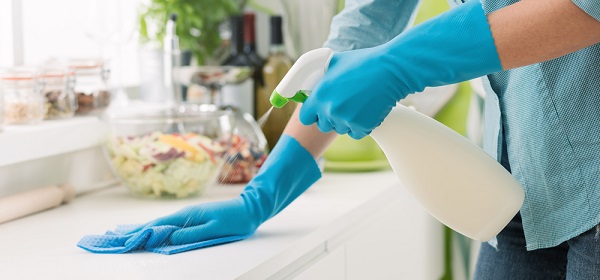How much time do you spend selecting your household cleaning products? Studies show that consumers spend mere seconds choosing products off the shelf. It’s no wonder then, that manufacturers use branding tricks, such as enticing colours and words like ‘BAM’ and ‘Earth Choice’, to catch your eye.
The fact is, most household cleaning products found in supermarkets contain toxic chemicals that are harmful to you and your family. Many ingredients can cause skin, eye and respiratory irritation.
So what’s the alternative if you’re wanting to switch to safer cleaning products?
According to Australian ethical consumer website Shop Ethical, you can learn about a product’s hazards by scouring the label. Unlike food or personal care products however, cleaning products don’t have to display a complete list of ingredients. Even so, packaging can provide useful information that can help you make greener and more ethical choices.
You can spot the most hazardous products based on warning labels on the back.
-
- ‘Caution’ indicates a slightly toxic product
-
- ‘Warning’ indicates a moderately toxic product
-
- ‘Danger/Poison’ indicates a most hazardous product.
Shop Ethical also suggests avoiding products or detergents containing:
-
- chlorine or ammonia, listed as active ingredients
-
- formaldehyde, terpenes, phenols, chlorine, organic mercurials, balsams, aluminium complexes, which are known to have carcinogenic effects
-
- alkylphenol ethoxylates (APEs), which do not degrade completely and are known hormone disruptors
-
- phosphates, which cause algal blooms in waterways.
Further, consumers are cautioned not to fall for unregulated ‘greenwash’ statements on product packaging, which claim to be ‘natural’ and ‘eco-friendly’ but are often capitalising on social trends.
Instead, you should look for:
-
- biodegradable to AS4351, or better still, to an international standard
-
- plant-based ingredients, instead of petroleum-based
-
- concentrated forms
-
- specific ingredient information, such as ‘solvent-free’ and ‘no petroleum-based ingredients’ rather than unregulated ‘greenwash’ claims.
If you’re looking to change to greener cleaning products, we’ve compiled a list of safer and more environmentally friendly options, so you can swap out those nasty chemical-based products:
-
- Ecostore Liquid Scourer (replacing Jif Cream Cleanser)
-
- Ecover Dishwash Liquid (replacing Earth Choice Dishwash Liquid)
-
- Resparkle Kitchen & Multi Surface Cleaner (replacing Ajax Spay & Wipe)
-
- Regular kitchen cloth and a homemade vinegar and water spray (replacing Dettol Antibacterial Surface Cleaning Wipes)
-
- Ecostore Dishwasher Tablets (replacing Finish All-in-One Dishwasher Tablets)
-
- Ecostore Over & Hob Cleaner (replacing Mr Muscle spray).
You might have to search a bit further than Coles or Woolies for these and pay a teeny bit extra, but they’re worth it. Check out your closest health food shops or the companies’ online stores.
Want to see how your products stack up to safety ratings? Environmental Working Group’s handy search function lets you search for 2500 products, providing you with comprehensive information about the health and environmental risks associated with them.
Want to go even greener and cheaper? Why not make your own DIY cleaning products? Share your suggestions in the comments section below.
Also read: Natural ways to clean your kitchen

